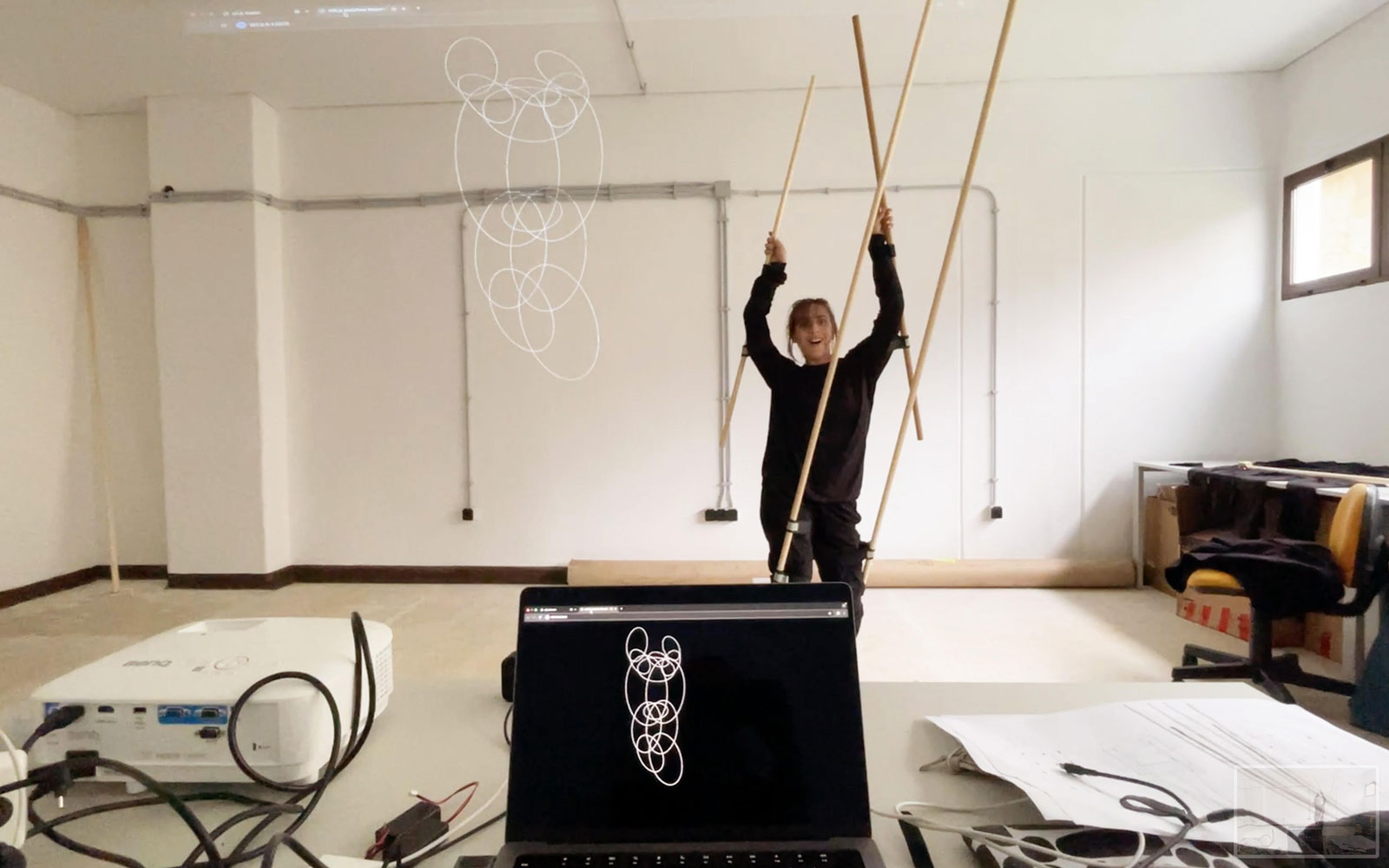
OSKAR is an experimental interactive installation inspired by Oskar Schlemmer’s *Stick Dance* exercise, investigating the relationships between body, movement, limitation, and technology. The installation invites reflection on how physical and digital constraints can, paradoxically, open new territories for bodily exploration.
The installation is organized into two minimalist spaces, A and B, each with its own screen, delineated by a line that both separates and connects them. In the first space, the user sees themselves digitally projected through a body posture detection system that virtually “dresses” them with Schlemmer’s sticks in their original configuration. This digital projection stems from previous work developed by Rita Olivença in her master’s thesis and collaborations with André Rocha, where they explored different ways of using motion detection for graphic generation.
The second space transitions this work into the realm of wearable artifacts. Here, physical sticks equipped with motion sensors at their extremities allow the performer to expand their exploration beyond the physical strangeness of wearing the object. The sensors capture and translate movement into hybrid interactions between body language and digital response.
As the foundation of the work is linked to the physical performance typical of circus arts, it seeks to explore digital and hybrid forms of new artifacts, props, and circus costumes. In this context, Oskar Schlemmer becomes a symbolic starting point for his exploration of space and movement—shaped by the limitations of the sticks and the way such restriction encourages the expression of new bodily languages, spatial exploration, and new interactions between parts of the body.
The installation also explores a conceptual duality. On one hand, it observes how the fixation on digitally capturing movement can become restrictive when contemplating our virtual transformation. On the other, it recognizes the re-empowerment brought by the wearable element, which automatically generates a new movement paradigm, opening unexplored territories of bodily expression.
This permanent installation will be temporarily inhabited by a performance featuring two circus artists who will freely explore the tools conceived within it. Through improvisation, the performers will use their movement skills to interact between the two spaces, aiming to discover and document potential future experiences.
With the participation of circus performers Catarina Ribeiro and Pedro Caetano. Sunday, november 16 at 1pm.
André Rocha is an assistant professor at the Polytechnic Institute of Lisbon and a visiting assistant professor at the Polytechnic Institute of Santarém. With a background in Industrial Design and a specialization in Product and Interaction Design, he is currently a PhD candidate in Digital Media at NOVA University Lisbon. His research explores the intersection of design and digital media, with a particular interest in knowledge transfer and management. Co-founder and scientific coordinator of Fablab Benfica since 2016, he also coordinates Maker Faire Lisbon. His current research examines the role of open design in educational contexts and in preserving the tacit knowledge of small agricultural communities.
Rita Olivença is a researcher in Fine Arts – Multimedia Art. Her research, *“Movement as Interaction: Contributions to the Use of Interactive Textile Artifacts in the Performing Arts”*, particularly in circus arts, explores relationships between the body, costume, and stage space through interactive textile artifacts.
She holds a degree in Fashion Design from the Faculty of Architecture – UTL (2006) and completed a Master’s in Graphic Design at ESAD.CR (2023) with the dissertation *“Circus Visual Communication – Digital Motion Capture as a Tool for Graphic Design.”* This work resulted in the *Traffic Lights Circus* project, featured in the art exhibition of PCD 2024 – Processing Community Day at FBAUP. Rita was a founding member of DAR – Design Advanced Resources, a non-profit association dedicated to open design practices. She frequently collaborates with Companhia da Esquina and Hipótese Contínua. In education, she stands out for her eleven years of teaching at EPAOE – Chapitô (Professional School of Performing Arts and Crafts) in the Set Design, Costume, and Props program.
